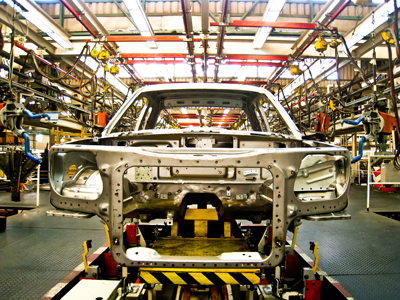Press Release: Carnegie Mellon's Erica Fuchs Discusses How Global Redistribution of Manufacturing Is Changing Innovation
Contact: Daniel Tkacik / 412-268-1187 / dtkacik@andrew.cmu.edu
PITTSBURGH—Location, location, location. That old real estate adage also applies to the manufacturing industry, says Carnegie Mellon University's Erica Fuchs.
Sending U.S. products overseas to be manufactured may be cheaper, but it also may stifle innovation depending on the technology and the constraints facing firms, says Fuchs in her paper published this week in Science. She suggests that differences across technological and business contexts make it critical to avoid one-size-fits-all policy on manufacturing.
"National differences in local production characteristics and consumer preferences change the technology development incentives of firms who locate there," said Fuchs, an associate professor of engineering and public policy at Carnegie Mellon. "As a consequence, the global shift of manufacturing from developed to developing countries is changing the future of products."
 Fuchs' research uses engineering models and empirical data to show that national differences in production characteristics — not just wages, but also yields, downtimes, materials and the organization of production — can be significant enough to affect which products are profitable for firms to produce. These differences also can lead to less innovation back in the U.S., especially for small firms pursuing early-stage technologies.
Fuchs' research uses engineering models and empirical data to show that national differences in production characteristics — not just wages, but also yields, downtimes, materials and the organization of production — can be significant enough to affect which products are profitable for firms to produce. These differences also can lead to less innovation back in the U.S., especially for small firms pursuing early-stage technologies.
"For certain products at the technological frontier, the production process is not yet understood, so designers need to be physically present to observe and experiment on the production line," Fuchs explained. "Often these same early-stage products also face small markets compared to the production necessary to efficiently manufacture."
In the case of high-end electronic components for communications, firms make rational short-term decisions by moving overseas and reducing costs, but they may be overlooking long-term benefits, such as gaining access to larger markets with new product technologies.
"In these extremely constrained cases, government funding may play an important role in supporting firms to keep manufacturing in the U.S. in pursuit of longer-term opportunities," Fuchs said.
Fortunately, increased global participation in manufacturing is not always harmful to innovation. In less constrained cases, the study says, firms can leverage differences in consumer preference and local production to increase innovativeness. For example, given global demand and efficient plant sizes, automobile body manufacturers are able to afford multiple regional manufacturing facilities, and do not face equivalent problems separating design from manufacturing.
These less constrained manufacturers also can leverage national differences to diversify their portfolio.
"Research shows that Chinese consumers may be more willing to pay for battery electric vehicles," Fuchs said. "That large demand in China could potentially increase incentives for electric vehicle production globally."
Fuchs says that government needs to take these differences facing firms into account in technology and manufacturing policy. "The very same policy that could enhance one sector could undermine another," she said.
Fuchs has been playing a growing role in national and international discussions on the future of advanced manufacturing and global innovation. In 2011, she advised the President's Council of Advisors on Science and Technology during a one-day workshop on the future of advanced manufacturing. The workshop contributed to the formation of the Advanced Manufacturing Partnership, a cross-sector effort by industrial and academic leaders to regain U.S. leadership in emerging manufacturing technologies.
###